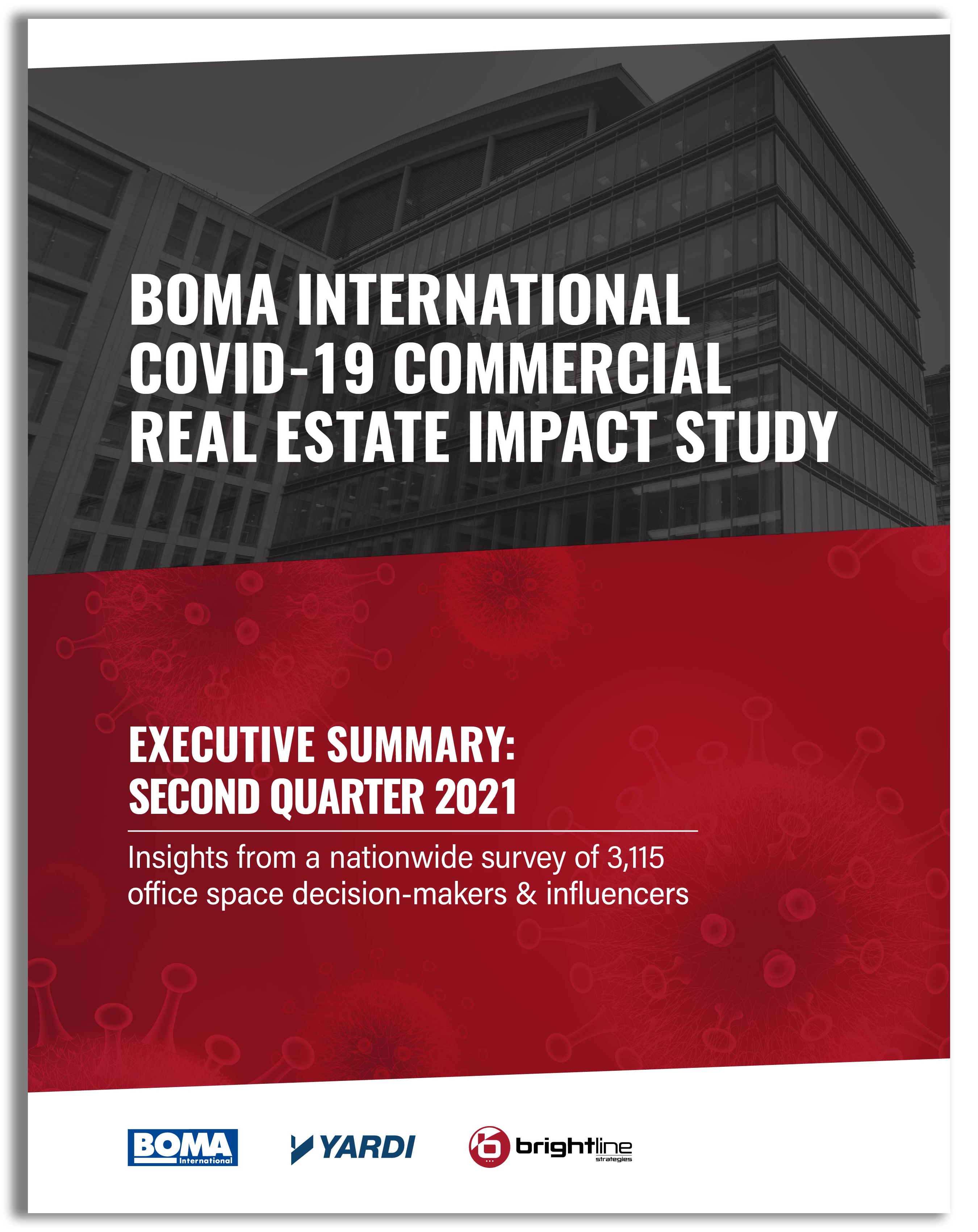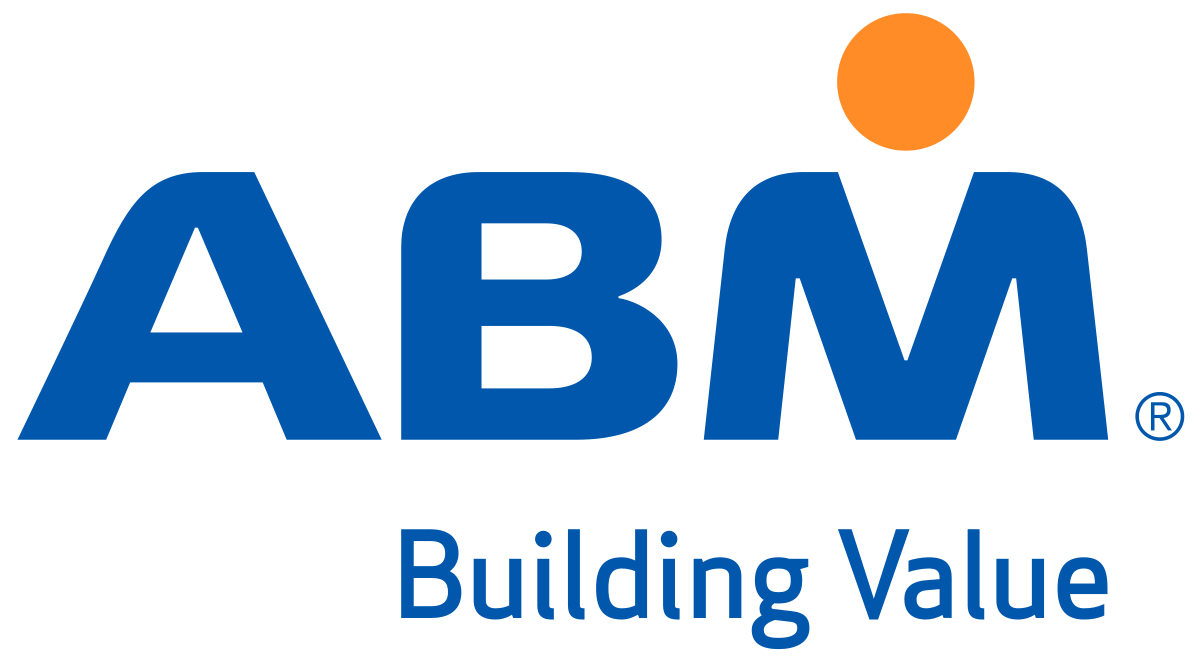by Brianna Crandall — August 13, 2021 — The Building Owners and Managers Association (BOMA) International, property management software developer Yardi and research and advisory services firm Brightline Strategies announced the release of findings earlier this summer from the second in a series of nationwide commercial real estate Covid-19 impact studies. Capturing the latest U.S. tenant sentiments as Covid-19 cases decline and vaccinations accelerate, the Q2 2021 BOMA International COVID-19 Commercial Real Estate Impact Study reveals that optimism around the return to the office is growing, mediated by office tenants’ increasing clarity around the “new normal” of on-site and remote work practices.
More than 3,000 commercial office space decision-makers were surveyed. While a large majority of tenant decision-makers still see office space as being vital to their business operations, tenants recognize a shift in pre-pandemic practices. Participants projected, on average, that fewer than half of their employees will work full-time in the office over the next 12-18 months.
Henry H. Chamberlain, APR, FASAE, CAE, president and COO of BOMA International, stated:
Covid-19 has created an inflection point across the commercial real estate landscape, and these study findings show the road ahead is going to pose different challenges and opportunities. The value and vitality of offices remain strong, and there is also tremendous opportunity for owners and operators to work collaboratively with their tenants on investments in building infrastructure, amenities, space designs and other features to create healthy, safe and productive workplaces.
Among the study’s key findings are:
- 65% of respondents feel the United States is heading in the right direction on Covid-19 management (up 28% from the prior study in Q4 2020).
- 78% of respondents affirm their in-person office is vital to operating their business but indicate that the future use of their space will change.
- Tenants anticipate a clear shift toward hybrid work options, as respondents reported the average amount of people working in the office full time would decrease from 70% prior to the pandemic to 43% over the next 12-18 months. Notably, they predict only about a quarter of the workforce (26%) will telework full-time/most of the time.
- The number of respondents across tenant sizes reporting they will reassess space needs (56%) has decreased 5 points since the prior study, while those responding unsure has climbed to 37%, up from the 19%. Among those respondents reassessing space, 48% would reduce their square footage, amounting to 37% of all office tenants surveyed (down from 43% in Q4 2020).
- Nearly 2/3 of tenants (64%) believe owners and operators should make additional space investments in either health and safety infrastructure and technology to potentially mitigate future health emergencies or wellness amenities, programming and platforms that support tenants’ efforts to increase organizational culture, connectivity, productivity and well-being.
- 86% approve of their property management company’s response to Covid-19 so far (vs. 77% in Q4 2020), demonstrating that commercial property owners and operators are delivering strong value to tenants in actively responding to the pandemic.
Additional findings explore the implications of Covid-19 and increased vaccination rates on economic/business impacts, space utilization, the likelihood of lease renewals and relocations, confidence in the safety of office spaces, and office return plans.
Robert Teel, vice president of Global Solutions, Yardi, remarked:
More than just capturing important sentiments on office space perceptions today, our major goal in this study is to inform industry stakeholders on what lies ahead and how we can all help shape it. From its impact on technology and infrastructure to common spaces and amenities, Covid-19 is an accelerant of ‘the future of the office.’ These survey results reveal what tenants find of greater value moving forward and the importance of collaboration between owners, operators and industry service providers.
Michael Broder, CEO of Brightline Strategies, pointed out:
More tenants embracing telework is an opportunity to craft office space that fosters increased in-person and remote productivity while serving as the hub for enhanced culture, communication and collaboration. When it comes to vitality and sustained utilization of in-person workplaces, this study helps us identify the ‘persuadables’ and provides owners and operators with the tools to engage them.
The nationwide study was underwritten by a grant from Yardi and developed by Brightline Strategies. This is the second in a series and was fielded March through May 2021 among 3,115 office space decision-makers and high-level influencers from across the United States with respondent oversampling in the top 20 U.S. markets. The first survey [see results on FMLink] was fielded from September through October 2020 among 3,010 office space decision-makers and high-level influencers across similar markets. The data were segmented and analyzed by industry, company size and stage of growth, office square footage, rent rate, renewal date, asset class, location and other key demographic and psychographic tenant characteristics.
The executive summary of the BOMA International Covid-19 Commercial Real Estate Impact Study can be found on the BOMA website. To request a full copy of the report, contact covidstudy@brightlinestrategies.com. Dive into the findings and learn what they mean for your property and the commercial real estate industry during one of three free information sessions now available on demand. Sessions explore the data related to office occupancy and demand, tenant expectations, and investment and workplace trends.





